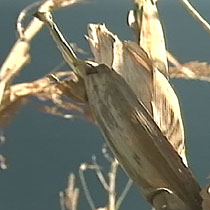-
(单词翻译:双击或拖选)
Washington
09 April 2007
Watch World Climate report
Thousands of climate scientists and government policy administrators1 from more than 120 countries worked on the report for six years. After a reported all night session on April 5, the United Nations' Intergovernmental Panel on Climate Change released its second major report on global warming. VOA's Paul Sisco has more.
The climate experts' report predicts rising temperatures will lead to more heat waves in the United States and elsewhere. It also envisions more hunger, particularly in the developing world; continued glacier2 melting; accelerated plant and animal extinctions; rising sea levels and associated environmental degradation4.
"The Working Group Two Report deals with impacts, adaptation and vulnerability," explains Panel Chairman Rajendra Pachauri. "And this is what determines responses that human beings and societies will make to counter this problem, to be able to manage this problem."
Panel co-chairman Martin Perry adds, "What they've done now is finally establish at the global level there is an anthropogenic, a man made, climate signal coming through on plants, animals, water and ice."
The report's conclusions are largely based on data that scientists see now. They include changing bird migrations5, earlier spring melts in temperate6 climate zones and rapidly declining tropical coral reefs in some warmer seas.
Life is sweet in the United States when you cast your fishing line in the Yellowstone River. But the United States is not exempt7 from the report's findings. This river, like most in western and southwestern United States, is severely8 stressed. The region is suffering from ten years of drought. Nevada's Lake Meade is 24 meters below normal levels. Docks hang from newly formed cliffs. And the once mighty9 Colorado River, from which seven U.S. states draw water, now trickles10 at the border between the United States and Mexico.
 |
| Heat wave means more drought |
One observer commented, "It is getting worse every year."
Chairman Rajendra Pachauri says this is based on scientific evidence, "You don't need faith to believe what is being put forward, what you have is solid scientific evidence.
The report concludes that the situation is worse than previously11 thought. And it says that if temperatures continue to rise, one billion people could face dangerous flooding, three billion, water shortages and many species face mass extinction3.
 收听单词发音
收听单词发音
1
administrators

|
|
| n.管理者( administrator的名词复数 );有管理(或行政)才能的人;(由遗嘱检验法庭指定的)遗产管理人;奉派暂管主教教区的牧师 | |
参考例句: |
|
|
|
2
glacier

|
|
| n.冰川,冰河 | |
参考例句: |
|
|
|
3
extinction

|
|
| n.熄灭,消亡,消灭,灭绝,绝种 | |
参考例句: |
|
|
|
4
degradation

|
|
| n.降级;低落;退化;陵削;降解;衰变 | |
参考例句: |
|
|
|
5
migrations

|
|
| n.迁移,移居( migration的名词复数 ) | |
参考例句: |
|
|
|
6
temperate

|
|
| adj.温和的,温带的,自我克制的,不过分的 | |
参考例句: |
|
|
|
7
exempt

|
|
| adj.免除的;v.使免除;n.免税者,被免除义务者 | |
参考例句: |
|
|
|
8
severely

|
|
| adv.严格地;严厉地;非常恶劣地 | |
参考例句: |
|
|
|
9
mighty

|
|
| adj.强有力的;巨大的 | |
参考例句: |
|
|
|
10
trickles

|
|
| n.细流( trickle的名词复数 );稀稀疏疏缓慢来往的东西v.滴( trickle的第三人称单数 );淌;使)慢慢走;缓慢移动 | |
参考例句: |
|
|
|
11
previously

|
|
| adv.以前,先前(地) | |
参考例句: |
|
|
|















